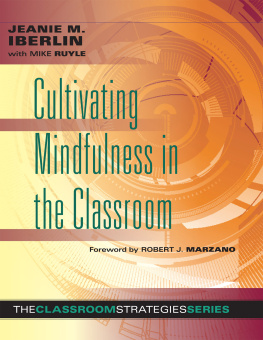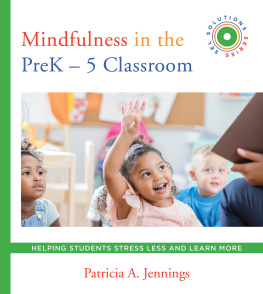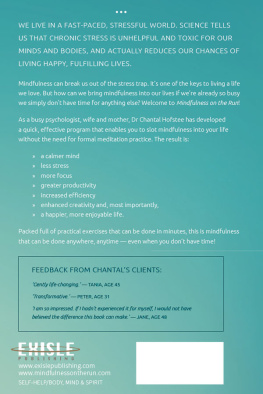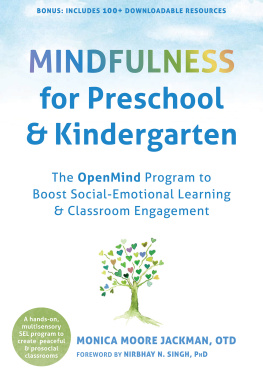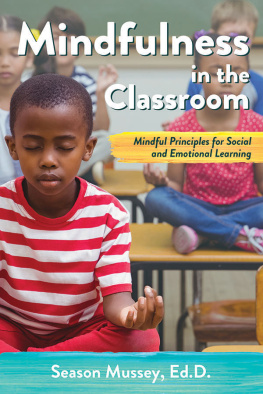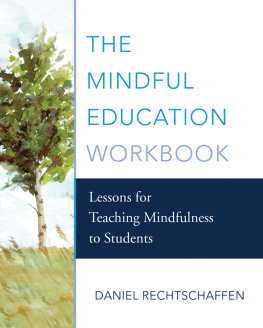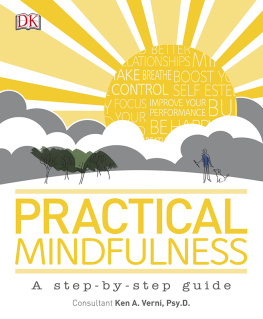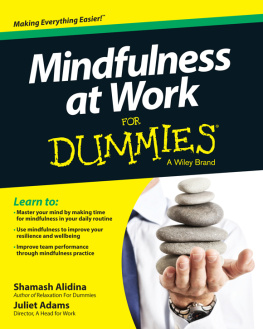
JEANIE M. IBERLIN
With MIKE RUYLE
Cultivating Mindfulness in the Classroom
Foreword by ROBERT J. MARZANO

THE CLASSROOM STRATEGIES SERIES
Copyright 2017 by Marzano Resources
Materials appearing here are copyrighted. With one exception, all rights are reserved. Readers may reproduce only those pages marked Reproducible. Otherwise, no part of this book may be reproduced or transmitted in any form or by any means (electronic, photocopying, recording, or otherwise) without prior written permission of the publisher and the authors.
555 North Morton Street
Bloomington, IN 47404
888.849.0851
FAX: 866.801.1477
email:
MarzanoResources.com
Visit MarzanoResources.com/classroomstrategies to download the free reproducibles in this book.
Printed in the United States of America
Library of Congress Control Number: 2016958919
ISBN: 978-1-943360-09-3
Text and Cover Designer: Abigail Bowen
On November 1, 2014, in the early hours of the morning, I received a call that anyone would dread to hear. I held my breath as my brother told me what I already knew in my gut. My best friend and sister, Julie, had committed suicide the night before. Several weeks later as I was packing her belongings, I noticed several unopened books, CDs, and videotapes about the topics of mindfulness and meditation. In her pain, she had been reaching out for a strategy to help her ease her suffering and bring her joy. Mindfulness, as a tool to help stop negative thinking and bring about a sense of peace, had arrived too late for Julie. As an avid meditator and practitioner of mindfulness since 1994, I know that if Julie had learned these strategies earlier, she might still be alive today. I am strongly aware that mindfulness is not a cure-all, yet I am also strongly aware that mindfulness has far-reaching benefitswhich this book introduces to educators for use in the classroom. Although I am not a mindfulness teacher, I have practiced intently and have served as a firsthand witness to the benefits it has provided me. This book is my gift to my sister and to children, young and old, who find life difficult. In loving memory, I dedicate this book to my sister, Julie.
Jeanie M. Iberlin
Visit MarzanoResources.com/classroomstrategies to download the free reproducibles in this book.
CONTENTS
Reproducibles are in italics.
ABOUT THE AUTHORS
Jeanie M. Iberlin, EdD, has thirty-two years of experience in education. She serves as associate superintendent of Johnson County School District in Wyoming, where she leads administrators, instructional facilitators, teachers, and other staff members in the areas of curriculum, instruction, assessment, evaluation, and professional development. Dr. Iberlin has been honored as Wyoming Assistant Superintendent of the Year for her leadership in the areas of assessment, curriculum, and instruction. She has served as a middle school principal and high school English teacher, and she has also served on several state committees. Dr. Iberlin earned an undergraduate degree from Chadron State College, a masters degree from the University of Wyoming, and a doctoral degree from Montana State University.

Mike Ruyle, EdD, served as a teacher, athletic coach, assistant principal, and program director in the San Francisco Bay Area and Montana for twenty-eight years. He has also been an adjunct professor and presenter at Montana State University. Dr. Ruyle created and implemented the first fully functional, performance-based model of education in Montana for the alternative program at Bozeman High School and created and led a district task force on the best practices in alternative education. His leadership in performance-based education has made him a sought-after presenter for the Office of Public Instruction, the Mass Customized Learning Summit, and numerous schools and districts throughout the Rocky Mountain region. He earned bachelor of arts degrees in history and English from the University of San Francisco and a masters degree and a doctoral degree in educational leadership from Montana State University.
FOREWORD
By Robert J. Marzano
Cultivating Mindfulness in the Classroom makes accessible to classroom teachers a set of strategies that can provide a missing foundation to the K12 educational process. Educators have long realized that there is more to teaching than imparting new knowledge and skills in a clear and concise manner. Rather, every student sitting in every classroom is dealing with a complex internal world that involves hopes, dreams, and goals. Thats the positive side of their internal worlds. The negative side includes fears, worries, regrets, and frustrations. Both sides color each students experience at every moment of the day. When the negative parts of students internal worlds start to outweigh the positive parts, they can be left distracted, confused, and incapable of learning. If this dynamic persists, students can slip into a negative spiral that might ultimately end in tragedy. Indeed, Dr. Iberlins deeply personal and moving dedication at the beginning of this book demonstrates the potential consequences of ignoring these negative dynamics. Thankfully, the authors provide educators with practical tools for addressing students internal worlds from both positive and negative perspectives. The strategies they provide all fall under the heading of mindfulness.
Jeanie M. Iberlin and Mike Ruyle begin with a solid chapter on the research underpinning their strategies. They start by surveying the research on the deleterious effects of negative attributions and emotions and end by articulating the potentially positive effects of focusing on mindfulness strategies. Next, they provide strategies for specific aspects or categories of mindfulness. They begin with stress reduction.
Stress is the hidden antagonist in everyones life. Fortunately, there are a variety of mindfulness techniques that educators can teach students, including breathing techniques, classroom adaptations of yoga, virtual field trips, and the like. One of the more useful aspects of Cultivating Mindfulness in the Classroom is that it provides essential learnings for each mindfulness strategy. For example, the essential learnings for a particular breathing strategy include the following.
Focused breathing reduces stress and instills a sense of calm.
Doing breathing exercises once a day helps students learn to breathe from their diaphragm.
Students can use this activity whenever they feel anxious or stressed.
Arguably, these essential learnings are as valuable as the strategies themselves because they help students gain an understanding of the connected nature of mind and body and how that connection affects their experiences moment to moment. Thus, the strategies students use in the classroom become a conduit to self-understanding and personal agency that extends far beyond the classroom.
Next page
